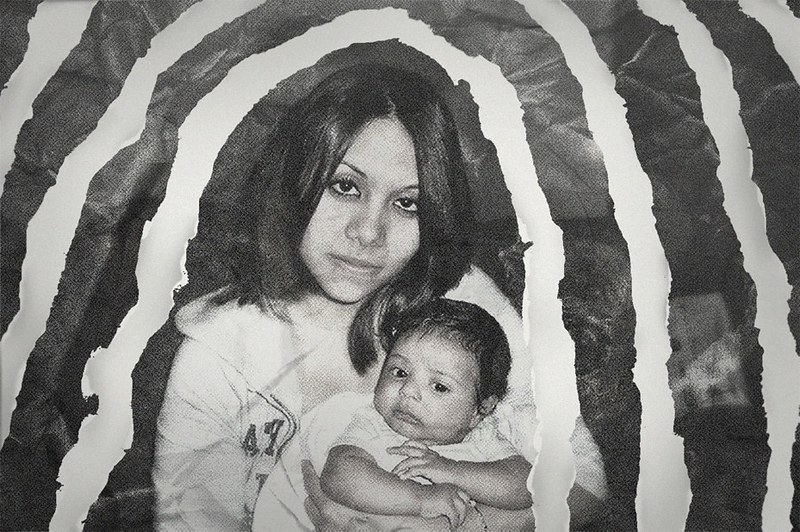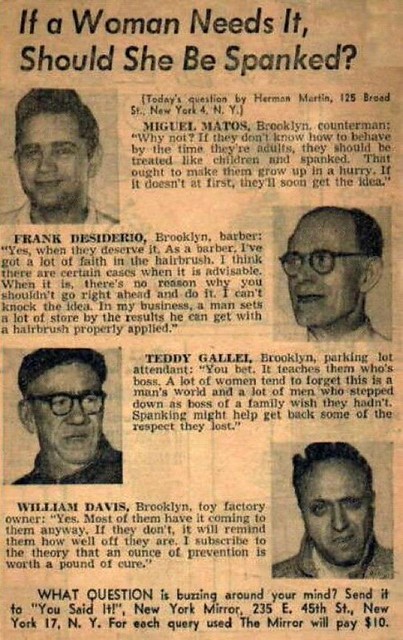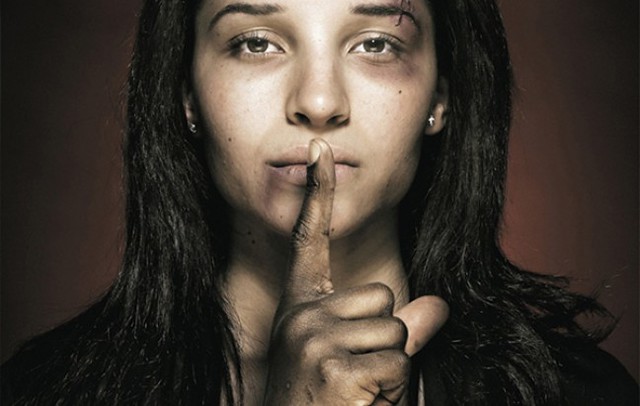Domestic Violence Is Not a Thing of the Past
I'm sorry for the abrupt switch from vintage swimwear and how to wear pastels to such a serious issue, but I recently read an article that got me thinking a lot about a very important issue: domestic violence. I should warn you that the post below might be triggering for some people.
********************************************************************************

Laura Aceves, 2009
I am a feminist, but I am also a person of privilege. I'm white; I have a college degree; I have enough money to be mostly financially secure; I'm cis-gender; I have a partner who would never dream of hurting me. The issues that I have to worry about, like street harassment and micro-aggressions at work, are aggravating and might disadvantage me financially compared to the men in my field, but it's rare that they put me in serious physical danger.
Last night I read an article that was absolutely gut-wrenching. The story of Laura Aceves, a young mother who was murdered by her violent ex-boyfriend, is an all too common one, but what really saddened and enraged me was the response from the authorities that she went to for protection. After being beaten and threatened by her boyfriend, she left him, and after he stalked and attacked her, she filed a restraining order. He violated the restraining order numerous times without consequences, and despite Aceves' frantic attempts to get help, he shot and killed her.
Some select quotes from the sheriff, Bob Grudek:

That's the response that a lot of people have when they hear tragic stories of domestic violence - "why don't they just leave?" And the fact is, it's not that simple. The women who are the most likely to be abused are also the women who are the least likely to have the resources to get away. They tend to be poorer, with less education. Often they have children, and they don't know how they're going to take care of them alone. Abusers will frequently isolate their victims, and they may feel like they have no place to go and no one to turn to.
My stepmother was a victim of domestic violence at the hands of the man that she was married to before she married my father. I heard stories from her and from her children, and I remember asking her why she didn't leave. This was in the 60s and 70s. She had six young kids, not much money, and a family where violence was the norm, not the exception. In her mind, there were no options. Staying was just what you did; quitting was the weak thing to do.
I'm ashamed, now, that I said that to her, but I think the response that I had was indicative of the way that most people think of violence against women - that it is something that they, somehow, control. You frequently hear the same language used against rape victims as you do against victims of domestic violence. They've "put themselves in a bad situation"; they're "asking for it"; they "should have tried harder to get away."

And many women do try to get away. They leave, the call the cops, they tell their families, they get restraining orders. Like Laura Aceves, they end up getting dragged back in by threats or coercion, or they are assaulted anyway. Statistically speaking, women are the most vulnerable shortly after they've left their partners, because leaving causes the abuser to escalate.
Sheriff Grubek was also wrong that there's nothing the authorities can do to stop it. In the past several years, there have been a lot of tools developed to help victims to domestic violence before they end up like Laura Aceves.
40% of people with no-contact orders violate them, but that number drops to close to zero when the offenders are forced to wear a GPS monitor. Judges in Arkansas, where she was killed, have the power to order offenders to wear them, but only three counties out of 75 there have done so.
Several cities and states have also created assessment programs to try and determine how likely an abuser is to escalate, and will take steps to intervene before the situation can worsen. Maryland, where the first program of this kind was developed, has seen a significant reduction in homicides relating to domestic violence.
There are also things that you can do. Write a letter to your state representative asking them to implement a Lethality Assessment Program in your area. You can also donate to the National Coalition Against Domestic Violence, or a local domestic violence charity or shelter in your area.
I do want to make a note that domestic violence, intimate partner violence, whatever you want to call it, is not an issue that affects just women. While women are more likely to be victims and are more likely to be killed at the hands of their partners, men can also be victims, and I don't want to diminish or neglect their experiences either.
As much as we may want to view domestic violence as a thing of the past, it is still an issue that affects millions of women every day. The only way that it's ever going to end is if we speak up about it, remove the shame and stigma from those who suffer, and use all of the tools at hand to stop the offenders as soon as we can.
********************************************************************************

Laura Aceves, 2009
I am a feminist, but I am also a person of privilege. I'm white; I have a college degree; I have enough money to be mostly financially secure; I'm cis-gender; I have a partner who would never dream of hurting me. The issues that I have to worry about, like street harassment and micro-aggressions at work, are aggravating and might disadvantage me financially compared to the men in my field, but it's rare that they put me in serious physical danger.
Last night I read an article that was absolutely gut-wrenching. The story of Laura Aceves, a young mother who was murdered by her violent ex-boyfriend, is an all too common one, but what really saddened and enraged me was the response from the authorities that she went to for protection. After being beaten and threatened by her boyfriend, she left him, and after he stalked and attacked her, she filed a restraining order. He violated the restraining order numerous times without consequences, and despite Aceves' frantic attempts to get help, he shot and killed her.
Some select quotes from the sheriff, Bob Grudek:
'“This is a very serious social problem,” he said, speculating that the crime was related to the breakdown of the traditional family structure. “Maybe if our culture goes back to when we had different values ... I don’t remember when I was a kid hearing about any domestic violence.”'
There are several things wrong with what Grudek has to say here. For one thing, domestic violence has been on the decline for the past several decades; the reason why he doesn't remember "hearing about any domestic violence" when he was a kid is that people didn't talk about it the way that we do now. It was something that frequently dismissed as distasteful, something that happened to a lot of women, but not something to be discussed in public. Oftentimes, it was something that "women brought on themselves," with their nagging and complaining, and if it was that big of a problem, "why don't they leave?"'Grudek said domestic violence prevention should focus on why women return to their abusers, and that it wasn’t “logical or responsible” to think the criminal justice system could solve the problem.'

That's the response that a lot of people have when they hear tragic stories of domestic violence - "why don't they just leave?" And the fact is, it's not that simple. The women who are the most likely to be abused are also the women who are the least likely to have the resources to get away. They tend to be poorer, with less education. Often they have children, and they don't know how they're going to take care of them alone. Abusers will frequently isolate their victims, and they may feel like they have no place to go and no one to turn to.
My stepmother was a victim of domestic violence at the hands of the man that she was married to before she married my father. I heard stories from her and from her children, and I remember asking her why she didn't leave. This was in the 60s and 70s. She had six young kids, not much money, and a family where violence was the norm, not the exception. In her mind, there were no options. Staying was just what you did; quitting was the weak thing to do.
I'm ashamed, now, that I said that to her, but I think the response that I had was indicative of the way that most people think of violence against women - that it is something that they, somehow, control. You frequently hear the same language used against rape victims as you do against victims of domestic violence. They've "put themselves in a bad situation"; they're "asking for it"; they "should have tried harder to get away."

And many women do try to get away. They leave, the call the cops, they tell their families, they get restraining orders. Like Laura Aceves, they end up getting dragged back in by threats or coercion, or they are assaulted anyway. Statistically speaking, women are the most vulnerable shortly after they've left their partners, because leaving causes the abuser to escalate.
Sheriff Grubek was also wrong that there's nothing the authorities can do to stop it. In the past several years, there have been a lot of tools developed to help victims to domestic violence before they end up like Laura Aceves.
40% of people with no-contact orders violate them, but that number drops to close to zero when the offenders are forced to wear a GPS monitor. Judges in Arkansas, where she was killed, have the power to order offenders to wear them, but only three counties out of 75 there have done so.
Several cities and states have also created assessment programs to try and determine how likely an abuser is to escalate, and will take steps to intervene before the situation can worsen. Maryland, where the first program of this kind was developed, has seen a significant reduction in homicides relating to domestic violence.
There are also things that you can do. Write a letter to your state representative asking them to implement a Lethality Assessment Program in your area. You can also donate to the National Coalition Against Domestic Violence, or a local domestic violence charity or shelter in your area.
I do want to make a note that domestic violence, intimate partner violence, whatever you want to call it, is not an issue that affects just women. While women are more likely to be victims and are more likely to be killed at the hands of their partners, men can also be victims, and I don't want to diminish or neglect their experiences either.
As much as we may want to view domestic violence as a thing of the past, it is still an issue that affects millions of women every day. The only way that it's ever going to end is if we speak up about it, remove the shame and stigma from those who suffer, and use all of the tools at hand to stop the offenders as soon as we can.
Jessica
